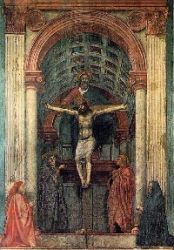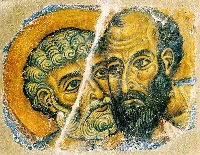The communion of love
by ENZO BIANCHI
Communion is the fruit and the manifestation of the love that, flowing out from the heart of the eternal Father, pours itself out on us through the Spirit that Jesus gives us
FEAST OF THE TRINITY
“The Church is full of the Trinity,” Origen already affirmed. On the Sunday after Pentecost western Christians celebrate this mystery. Yet, from the beginnings of its reflection on faith, the Church has appraised the poverty of human language in rendering fully an account of the mystery of love and of life that exists in the Tri-unity of God, in the Trinitarian communion that molds man’s very existence and establishes the ecclesiology of communion. Yes, because Christians are monotheists and from the very first centuries all their efforts to express their faith tend towards protecting that precious gift of monotheism which they received from Israel: a gift that is combat without truce or quarter against idolatry, against manipulation of the divine, against distortion of the image of God deposited in man, which can disfigure it into a caricature of a god in the image of man.
For the disciples of Jesus God — the God of the fathers, the God of Abraham, Isaac, and Jacob, the God of the living and the dead, the God who made Israel issue out of slavery and whop gave it the Law of life on Sinai — is One and has shown himself fully in Jesus, Lord and Savior. This means, according to the adage of the fathers of the undivided Church, that God has made himself present in him without becoming confused with him: in Jesus, true God and true man, humanity does not absorb divinity and divinity does not cancel humanity. These are the fundamental terms of that enormous effort of theological reflection of the first Christian communities and are also the fruit of the ineffable spiritual and ecclesial experience that will lead to the definition of the Trinitarian mystery.
But the Gospel, the “good news” of Jesus of Nazareth passed on from generation to generation in the community of believers, tells us not only that God exists and that he is one: it also — and especially — tells us who he is. In the Spirit the Son leads his disciples to a loving knowledge of the Father and to the Trinitarian communion. In baptism, in fact, the Christian is immersed into the death and resurrection of Christ, receives the Holy Spirit, and is proclaimed “son” of the Father; he thus becomes a member of Christ’s body, which is the Church: ecclesiology is intimately connected with the mysteries that are at the heart of Christian revelation. The Tri-unity of God can be known only through the plural unity of the catholic Church — that is, literally, the Church “aggregated according to the whole” — and, equally, the Church possesses its “catholicity” only because the Son and the Spirit, sent by the Father, have unveiled to it the Trinity, not as an abstract intellectual fact, but rather as rule, norm, canon of its own life.
The Church, then, receives this Trinitarian life not to reduce it to a jealous possession, but to diffuse it by communicating it to humanity and to the entire cosmos. The ecclesiology of communion, about which so much has been said ever since Vatican II, is not, then a new strategy or a concession to a more widespread democratic sensibility, but is a constitutive element of the eucharistic community itself, molded into an image of the Trinitarian communion. This awareness permits us to gather the theological and revelatory intention with which John Paul II, after having invited the entire Church in the years preceding the Jubilee of 2000 to a wide-ranging reflection on the three Persons of the Trinity, as his Tertio millennio adveniente suggested, asked then in Novo millennio ineunte to “make the Church the home and school of communion”: the intimate and inseparable tie between Trinitarian life and Christian discipleship here merges with a rare concision and efficacy. Thus, in the words of that apostolic letter, we can reassume the Trinitarian mystery in its manifestation to men through the “great sign” of fraternal love. “Communion (koinonía) incarnates and manifests the very essence of the Church’s mystery. Communion is the fruit and the manifestation of the love that, flowing out from the heart of the eternal Father, pours itself out on us through the Spirit that Jesus gives us, to make of us all ‘one heart and one soul’. It is in carrying out this communion of love that the Church is shown as ‘sacrament’, that is, ‘a sign and instrument of intimate union with God and of the unity of the entire human race’” (NMI 42). Yes, the ineffable mystery of the Tri-unity of God is entrusted to the “body of Christ” that is the Church, delation in history of Jesus’ salvific mission: to free the human being and the entire creation from death. This final liberation we receive as the Father’s gift, a gift made flesh in Jesus and which we strive to live day after day, letting ourselves be guided by the Spirit.
Enzo Bianchi
{link_prodotto:id=320}






